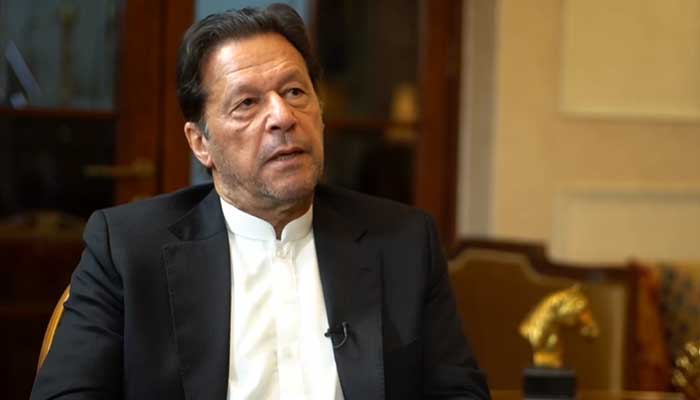System can't work if army chief has authority and responsibility lies with PM: Imran Khan
An elected govt which has responsibility must also have authority, says Imran Khan
Pakistan Tehreek-e-Insaf (PTI) Chairman Imran Khan believes that a country's system fails if its elected government doesn't have both responsibility and authority.
The former prime minister — who was ousted via a no-confidence motion last year — expressed these views in an interview with the US broadcaster, Voice of America, stressing that the elected governments must have authority as well as responsibility.
"The leading principle of the balance [of power] is that the elected government that has the responsibility, which people have mandated through their vote, must also have the authority," Khan said.
He said that responsibility and authority cannot be separated and hence a system cannot work if the two things are not vested in the same individual.
"If the authority lies with the army chief, [but] responsibility lies with the prime minister, no management system works," Khan added.
While responding to a question regarding his relationship with the military as the premier, the PTI chief said that all the policies of the military in Pakistan depend on one individual.
"Military [in Pakistan] means one man, the army chief. So, the whole policy of military vis-a-vis their dealing with the civilian government depends on the personality of one man," he said.
Khan said that the positive side of his relationship with the then-army chief, General Qamar Javed Bajwa was his government having the "organised strength of Pakistan army to help us".
He said that the effect of this relationship was seen in the form of Pakistan's successful response to COVID-19.
The "problem", according to Khan, occurred when Gen (retd) Bajwa "favoured some of the biggest crooks in this country"
He claimed that the former army chief wanted his government to turn a blind eye to the "big problem" and work in cooperation with the corrupt leaders, "giving them immunity from their corruption cases".
Khan further stated that Gen (retd) Bajwa had close ties with Prime Minister Shehbaz Sharif and they "conspired", and as a result the "regime change took place".
He, however, claimed that the new military leadership of the country had realised that the "experiment of regime change has gone wrong".
Khan said that Pakistan’s economy has gone into a tailspin and the country is facing the worst political and economic crisis in history.
Sharing his views on his demand for general elections, the PTI chief said that staging free and fair elections was not possible anymore as the credibility of the Election Commission of Pakistan (ECP) as an impartial electoral body had been destroyed.
"There was a local government election in Sindh, that all the political parties rejected," Khan said.
'Good ties with Afghanistan inevitable for Pakistan'
While talking about Pakistan's bilateral ties, Khan said that having good relationship with Afghanistan, regardless of any government in the neighbouring country, was inevitable for Pakistan.
"Whatever government is in Afghanistan, Pakistan must have a good relationship with them," he said, adding that as the prime minister of Pakistan, he tried his best to keep up with Ashraf Ghani-led government on good terms in order to get Kabul's help in dealing with terrorism.
It was disturbing that Foreign Minister Bilawal Bhutto-Zardari had spent almost all his time out of Pakistan, but hadn't paid a single visit to Afghanistan, he said in response to a question about incumbent government's failure in getting assistance from Afghanistan against rising terrorism in the country.
He said that Pakistan was "not in a position to have another war on terror".
-
Security forces gun down 30 terrorists in multiple IBOs in KP: ISPR
-
MQM-P calls for new province in Sindh
-
US report validates Pakistan military edge over India: PM
-
Banned TTP poses serious threat to Pakistan security: UNSC panel
-
CM Afridi clarifies remarks on by-poll after ECP requests army deployment
-
Dubai sees 3.2m Pakistani passengers in 2025 as airport sets new milestone
-
Security forces kill 23 Indian proxy terrorists in KP's Kurram
-
Pakistan to construct island to boost oil exploration: report












